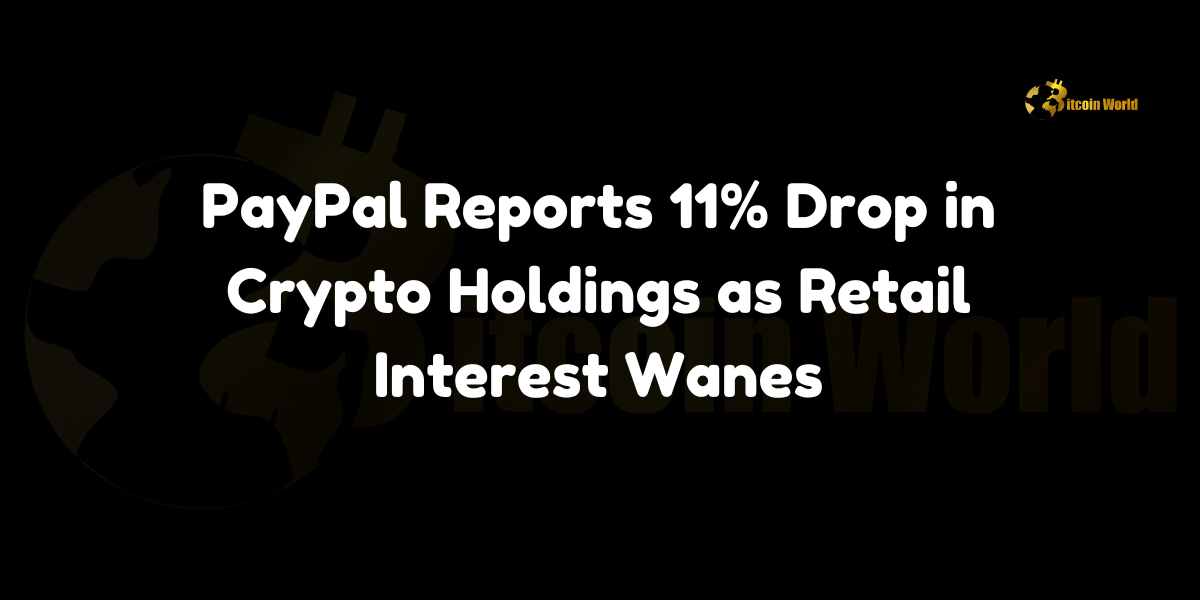PayPal Reports 11% Drop in Crypto Holdings as Retail Interest Wanes
PayPal has announced an 11% decline in its cryptocurrency holdings for the third quarter, bringing its total crypto reserves down to $2.17 billion, according to DL News. This reduction includes a 1% decrease in Bitcoin (BTC) holdings and a significant 27% drop in Ether (ETH) reserves. The trend indicates a weakening of retail interest in cryptocurrencies, contrasting sharply with the rising institutional inflows into spot Bitcoin ETFs since their U.S. launch. The overall sentiment among retail investors will become clearer as Robinhood and Coinbase Exchange release their Q3 crypto transaction data.
Introduction to PayPal’s Crypto Holdings Decline
Overview of PayPal’s Crypto Strategy
PayPal has been a prominent player in the cryptocurrency market, offering its users the ability to buy, sell, and hold various digital assets directly within its platform. The company’s foray into crypto was aimed at tapping into the growing demand among retail investors and providing a secure and user-friendly gateway to digital assets.
Recent Decline in Crypto Holdings
In the third quarter, PayPal reported an 11% reduction in its crypto holdings, amounting to $2.17 billion. The decrease is primarily driven by a 1% reduction in Bitcoin holdings and a notable 27% drop in Ether reserves. This decline suggests a pullback in retail investment activities and a possible shift in PayPal’s strategic approach towards its crypto offerings.
Factors Contributing to the Decline
Weaker Retail Interest
The reduction in PayPal’s crypto holdings is reflective of a broader trend of diminishing retail interest in cryptocurrencies. Several factors may be contributing to this decline:
Market Volatility: Persistent price fluctuations and market uncertainty can deter retail investors from maintaining or increasing their crypto positions.
Regulatory Concerns: Ongoing regulatory scrutiny and potential future regulations may create apprehension among retail users about the stability and security of their crypto investments.
Competition from Other Platforms: The availability of alternative platforms offering more attractive incentives or better user experiences could be siphoning interest away from PayPal.
Contrast with Institutional Inflows
While PayPal is experiencing a decline in crypto holdings, institutional investors are increasingly channeling funds into spot Bitcoin ETFs. These ETFs have seen significant demand since their introduction in the U.S., driven by:
Increased Institutional Confidence: Institutional players are seeking regulated and secure investment vehicles for Bitcoin exposure.
Enhanced Market Liquidity: The influx of institutional funds enhances liquidity, making Bitcoin a more stable and attractive asset for large-scale investments.
Regulatory Approval: The approval of spot Bitcoin ETFs by regulatory bodies has provided a framework that reassures institutional investors about the legitimacy and security of their investments.
Implications for the Cryptocurrency Market
Impact on Market Sentiment
The divergence between retail and institutional investment trends has several implications:
Shift in Market Dynamics: A stronger presence of institutional investors can lead to more stable price movements and reduced volatility in the long term.
Influence on Price Trends: Institutional inflows can exert upward pressure on Bitcoin prices, potentially offsetting the negative sentiment from retail declines.
Market Maturity: The increasing role of institutional investors signifies a maturation of the cryptocurrency market, moving towards more mainstream acceptance and integration with traditional finance.
Future Projections
Analysts suggest that the crypto market may continue to see a separation between retail and institutional activities:
Retail Investors: May adopt a more cautious approach, focusing on long-term holdings rather than active trading.
Institutional Investors: Expected to drive sustained growth through significant capital allocations into regulated investment products like spot Bitcoin ETFs.
Expert Opinions
Dr. Emily Carter, Blockchain Analyst
“PayPal’s reduction in crypto holdings highlights the challenges faced in sustaining retail interest amidst a volatile market. However, the growing institutional inflows into spot Bitcoin ETFs indicate a promising future for cryptocurrencies as legitimate investment assets.”
Mark Thompson, Financial Strategist
“The contrasting trends between retail declines and institutional inflows suggest a shifting landscape in cryptocurrency investments. Institutions bring stability and significant capital, which could lead to more mature and less speculative market dynamics.”
Sarah Lee, Cryptocurrency Researcher
“PayPal’s experience underscores the importance of understanding different investor segments. While retail interest may wane, institutional support remains a critical driver for the ongoing adoption and legitimacy of cryptocurrencies.”
Upcoming Insights from Robinhood and Coinbase Exchange
Anticipated Q3 Transaction Data
The upcoming release of Q3 crypto transaction data from Robinhood and Coinbase Exchange is expected to provide further clarity on retail sentiment:
Robinhood: As a platform popular among retail investors, Robinhood’s data will offer insights into trading volumes, asset preferences, and overall user engagement.
Coinbase Exchange: Known for its comprehensive crypto services, Coinbase’s transaction data will shed light on the broader trends in crypto investments, including any shifts in retail participation.
Potential Market Reactions
The data from Robinhood and Coinbase will likely influence market perceptions and investor strategies:
Positive Data: Could indicate a resurgence in retail interest, potentially stabilizing or increasing crypto holdings among major platforms.
Negative Data: May confirm the current trend of declining retail interest, prompting further strategic adjustments by platforms like PayPal to re-engage users.
Future Outlook
Strategic Adjustments by PayPal
To counteract the decline in crypto holdings, PayPal may consider:
Enhanced User Incentives: Introducing rewards, lower fees, or improved user interfaces to attract and retain retail investors.
Expanded Asset Offerings: Adding more cryptocurrencies or tokenized assets to cater to diverse investor preferences.
Educational Initiatives: Providing resources and tools to educate users about the benefits and risks of cryptocurrency investments.
Broader Market Trends
The ongoing evolution of the cryptocurrency market will be influenced by:
Regulatory Developments: Continued efforts to establish clear and supportive regulatory frameworks for digital assets.
Technological Innovations: Advancements in blockchain technology that enhance security, scalability, and usability of cryptocurrencies.
Global Economic Factors: Macroeconomic conditions that drive investor behavior towards or away from risk assets like cryptocurrencies.
Conclusion
PayPal’s reported 11% decline in crypto holdings for Q3 highlights a period of reduced retail interest in cryptocurrencies. This trend stands in contrast to the increasing institutional inflows into spot Bitcoin ETFs, reflecting a shift in the investment landscape towards more regulated and stable investment vehicles. As the cryptocurrency market continues to mature, the interplay between retail and institutional investors will shape the future trajectory of digital assets. Upcoming transaction data from platforms like Robinhood and Coinbase Exchange will provide further insights into the evolving sentiment and potential strategies for market participants.
To stay updated on the latest developments in cryptocurrency investments and market trends, explore our article on latest news, where we cover significant events and their impact on the digital asset ecosystem.





